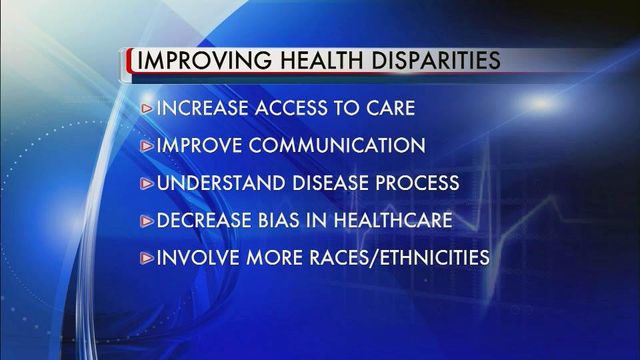Duke symposium looks at ways to reduce health disparities
Although there have been many advances in health care, there is still a large gap in the rate of disease and survival between the general population and underserved groups. Solutions begin with planning and strategy, which was the idea behind "Duke Health Disparities Colloquium."
Posted — UpdatedAlthough there have been many advances in health care, there is still a large gap in the rate of disease and survival between the general population and underserved groups.
Solutions begin with planning and strategy, which was the idea behind "Duke Health Disparities Colloquium."
Public health experts, physicians and researchers met to identify problems and forge partnerships to reach people in need.
A key target of the effort is identifying people with undiagnosed high blood pressure.
“African-Americans, for example, are substantially more likely to have high blood pressure, meaning that their blood pressure is high compared to whites with high blood pressure,” said Dr. Leigh Ebony Boulware, chief of Duke General Internal Medicine. “We've had those differences for over 30 years, yet we haven't been able to improve that.”
Boulware, who spoke at the colloquium, said uncontrolled high blood pressure leads to higher risks for cardiovascular disease, stroke and kidney disease. She said the solution lies in developing partnerships among health care systems, clinics, local doctors and community organizations to improve access to care.
“Doing everything we can as community members, as patients ourselves, in our roles, at work, at home - this all contributes to the health of our population,” she said. “Having that as a goal to eliminate disparities is of paramount importance.>
WRAL health expert Dr. Allen Mask said there are big disparities in the prevalence of Type 2 diabetes and outcomes related to complications such as kidney disease or even death.
“We know that there are racial and ethnic disparities in cardiac procedures like coronary artery bypass grafts and implantable defibrillators,” he said. “We know that African-American patients with depression are far less likely than whites to receive Electroconvulsive Therapy, sometimes called ECT.”
Reducing health disparities is intrinsically tied to improving health care quality, Mask said. That can be achieved by increasing access to care.
“Improve the way we communicate about disease, work on understanding what role genetics, physiology and biology play in understanding the disease process,” Mask said. “We can work on eliminating or decreasing the role of explicit or implicit bias in healthcare delivery. We have to involve more people of color in clinical trials and in the decision making roles of how research studies are designed and how we can best engage the community.”
• Credits
Copyright 2024 by Capitol Broadcasting Company. All rights reserved. This material may not be published, broadcast, rewritten or redistributed.





